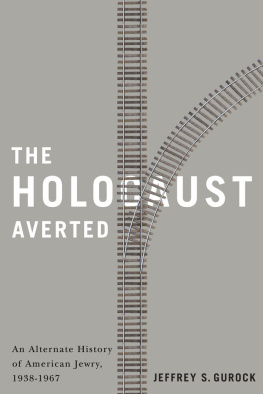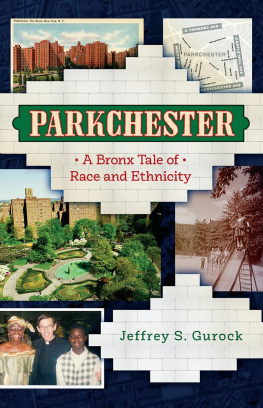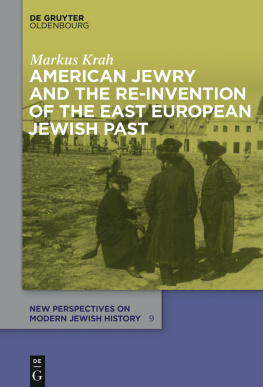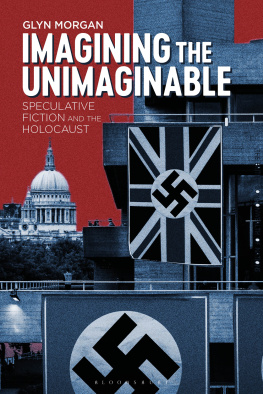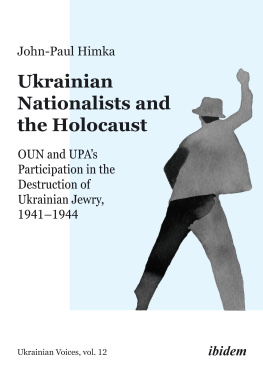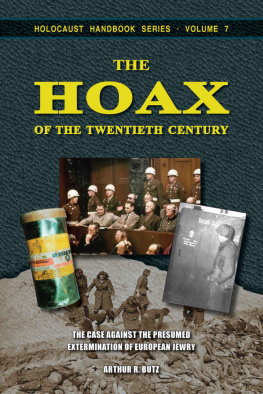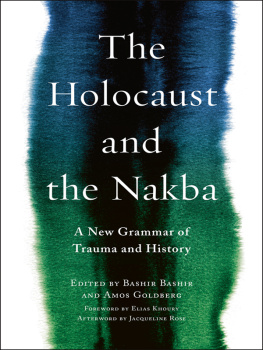Gurock - The Holocaust Averted: An Alternate History of American Jewry, 1938-1967
Here you can read online Gurock - The Holocaust Averted: An Alternate History of American Jewry, 1938-1967 full text of the book (entire story) in english for free. Download pdf and epub, get meaning, cover and reviews about this ebook. City: New Brunswick, year: 2015, publisher: Rutgers University Press, genre: History. Description of the work, (preface) as well as reviews are available. Best literature library LitArk.com created for fans of good reading and offers a wide selection of genres:
Romance novel
Science fiction
Adventure
Detective
Science
History
Home and family
Prose
Art
Politics
Computer
Non-fiction
Religion
Business
Children
Humor
Choose a favorite category and find really read worthwhile books. Enjoy immersion in the world of imagination, feel the emotions of the characters or learn something new for yourself, make an fascinating discovery.
The Holocaust Averted: An Alternate History of American Jewry, 1938-1967: summary, description and annotation
We offer to read an annotation, description, summary or preface (depends on what the author of the book "The Holocaust Averted: An Alternate History of American Jewry, 1938-1967" wrote himself). If you haven't found the necessary information about the book — write in the comments, we will try to find it.
Gurock: author's other books
Who wrote The Holocaust Averted: An Alternate History of American Jewry, 1938-1967? Find out the surname, the name of the author of the book and a list of all author's works by series.
The Holocaust Averted: An Alternate History of American Jewry, 1938-1967 — read online for free the complete book (whole text) full work
Below is the text of the book, divided by pages. System saving the place of the last page read, allows you to conveniently read the book "The Holocaust Averted: An Alternate History of American Jewry, 1938-1967" online for free, without having to search again every time where you left off. Put a bookmark, and you can go to the page where you finished reading at any time.
Font size:
Interval:
Bookmark:
The Holocaust Averted
The Holocaust Averted
An Alternate History of American Jewry, 19381967
JEFFREY S. GUROCK

RUTGERS UNIVERSITY PRESS
NEW BRUNSWICK, NEW JERSEY, AND LONDON
LIBRARY OF CONGRESS CATALOGING-IN-PUBLICATION DATA
Gurock, Jeffrey S., 1949 author.
The Holocaust averted : an alternate history of American Jewry, 19381967 / Jeffrey S. Gurock.
p. cm.
Includes bibliographical references.
ISBN 9780813572376 (hardcover : alk. paper) ISBN 9780813572390 (e-book (epub)) ISBN 9780813572406 (e-book (web pdf))
. JewsUnited StatesPolitics and government20th century. 2. ZionismUnited StatesHistory20th century. 3. JewsUnited StatesAttitudes toward Israel. 4. JewUnited StatesIdentity. 5. Israel and the diaspora. 6. United StatesPolitics and government20th century. 7. Arab-Israeli conflictInfluence. I. Title.
E184.36.P64G87 2015
973'.04924dc23
2014021724
A British Cataloging-in-Publication record for this book is available from the British Library.
Copyright 2015 by Jeffrey S. Gurock
All rights reserved
No part of this book may be reproduced or utilized in any form or by any means, electronic or mechanical, or by any information storage and retrieval system, without written permission from the publisher. Please contact Rutgers University Press, 106 Somerset Street, New Brunswick, NJ 08901. The only exception to this prohibition is fair use as defined by U.S. copyright law.
Visit our website: http://rutgerspress.rutgers.edu
Manufactured in the United States of America
For Dahlia Ruth and Sophie Ann
Contents
It is a pleasure to thank the people who inspired and assisted me in the writing of this book. While I began my intellectual and personal journey in the summer of 2005 into a world of Jewish, American, and world destinies that might have beenmuch more on that emotionally stirring experience in the Prologuemany of my early cogitations and considerations were crystallized during a sojourn at the bucolic College of Charleston in the spring of 2013. I am especially grateful to Professor Ted Rosengarten, the schools expert on Holocaust studies, who carefully read an early draft of my work in progress. I benefitted greatly from his wise critique, counsel, and friendship. Returning to New York and to my home institution, Yeshiva University, I was, as always, encouraged to continue my work by my rabbi, our provost Dr. Morton Lowengrub. At Yeshivas library, John J. Moryl and Mary Ann Linahan were of inestimable help. Among my network of friends in the academy, Professors Marc Lee Raphael of the College of William and Mary and Benjamin R. Gampel of the Jewish Theological Seminary of America stand out for their willingness to take time from their own scholarly labors to serve as sounding boards for my ideas. I am also especially thankful that Professor Gavriel Rosenfeld of Fairfield University, who has done more than any other scholar to bring alternate history into the academy, reviewed and commented on a section of the book (a portion of which will appear in his forthcoming volume of counterfactual essays). I am also grateful to Marlie Wasserman, the director of Rutgers University Press, for her sustained interest in my novel approach to history. Thanks are also due to the anonymous outside readers who made important contributions to the quality of my work.
As with all my creative endeavors, I am heartened and energized by the loving support from my ever-growing family. I look forward to dinnertime debates over the book with Eli, Sheri, Dan, Rosie, and Michael. I hope that Audrey and Mira will join the conversation. For now, Zev, Margot, Hannah, Dahlia, and Sophie will have to content themselves with seeing their names in print. Finally, Pamela, the bedrock of the Gurocks, shares with me the joy of another completed project.
Jeffrey S. Gurock
Riverdale, Bronx, New York
The Holocaust Averted
The restored Jewish quarter in the Kazimierz District of Krakow, Poland, became, in the late twentieth century, a tourist attraction. Visitors walked within the narrow streets of this section of the city and discoveredwith their website printouts as guidesa unique atmosphere of the Jewish past of this area. For an authentic retrospective on a civilization that was no more, travelers stopped at the Museum of Judaism housed within the Old Synagogue, a sanctuary that dated back to the fifteenth century. In 1495, King Jan I Olbracht first moved the Jews who were under his protection to these streets. For a sense of what day-to-day life had been like in the centuries before World War II, the intrigued perambulatedparticularly on Sundaythrough a farmers market where produce, full of fresh delicacies, was brought to city dwellers. Around the square that held the market were many cafs with excellent Jewish restaurants, albeit no kosher ones. Those interested in souvenirs or curios recalling Jewish culture wandered through bookstores and gift shops, many with faux Jewish merchant signs. Local promoters asserted that the bustling and live again quarter had become Krakows equivalent of Londons Soho, Pariss Quartier Latin, and New Yorks [Greenwich] Village. So lifelike was the scene that when Steven Spielberg filmed Schindlers List, he used that site as an authentic Jewish quarter rather than Grodgorze, the area that the Nazis actually constructed as a ghetto.
In the summer of 2005, my wife and I mixed with these crowds on a guided tour through Poland and Ukraine conducted by a fellow historian. We were on a mission to study, memorialize, and meditate about a lost Jewish civilization. The high point of our visit to Kazimierz was our attendance at religious services in the heart of the square at the famous Remah Synagogue, named after the great sixteenth-century rabbinical sage Rabbi Moses Isserles. The six men in our contingent, combined with an elderly man who had fled to Palestine in 1938returning for the first time on the way to see what remained of his old shtetland his son, joined two locals. Our wives also attended Sabbath services, but since this was an Orthodox synagogue, they were not counted toward the minyan. During the prayers, a group of Israeli Army officers, on their own inspirational tour of the Jewish past, supplemented our group. It was an uncommonly moving experience for me to step up to lead a portion of the services. Emerging from the small, one-story shul, I was struck with sadness about what was obviously missing as we walked around the bustling square. There were the shops, cafes, stores, and the Remahs cemetery to be visited. But except for those two old Jews with whom we had prayed, there were no Polish Jews around.
As a Jew and as a historian, I knew the obvious answer to the rhetorical question of Where were they? Although in recent decades, major efforts have been made to develop a new Jewish presence in Poland mainly from among Jews who have migrated from the former Soviet Union, an indigenous community has been dead for more than fifty years. In 1943, Kazimierzs 17,000 Jews were deported primarily to Auschwitz, where the vast majority was liquidated. With all those Jews long gone, there was a lamentable ghostlike quality to the surroundings. I almost expected Jews to come out of the old homes on the side streets to greet us as they assumed their longstanding positions behind street carts selling produce, or looking wisely over our shoulders helping us choose the most interesting Jewish book from their stock of religious and secular Yiddish and Hebrew writings, or offering us a glass of tea to complete the kosher meal served in their restaurants. But, of course, they were not there.
Two years later, I happened upon a New York Times article by Craig S. Smith entitled In Poland, a Jewish Revival ThrivesMinus Jews that only reinforced my feelings about those Polish Jewish apparitions. Smiths account certainly had an upbeat quality as he wrote about Jewish style restaurants... serving up platters of pirogis, klezmer
Next pageFont size:
Interval:
Bookmark:
Similar books «The Holocaust Averted: An Alternate History of American Jewry, 1938-1967»
Look at similar books to The Holocaust Averted: An Alternate History of American Jewry, 1938-1967. We have selected literature similar in name and meaning in the hope of providing readers with more options to find new, interesting, not yet read works.
Discussion, reviews of the book The Holocaust Averted: An Alternate History of American Jewry, 1938-1967 and just readers' own opinions. Leave your comments, write what you think about the work, its meaning or the main characters. Specify what exactly you liked and what you didn't like, and why you think so.

